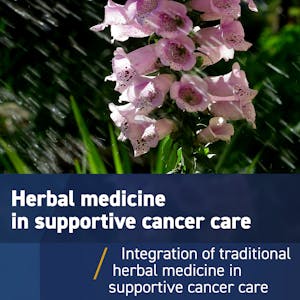Please join us for an innovative journey exploring Traditional Herbal Medicine in Supportive Cancer Care. This comprehensive course delves into concepts in Integrative Oncology, effective communication skills, and designing patient-tailored treatment programs. You will gain insights from leading experts across the world, covering traditional herbal medicine in different cultural contexts and its application in supportive and palliative cancer care.
With a focus on non-conventional approaches to medical treatment, the course addresses the emergence of a holistic approach in oncology care and the transition from an alternative to an integrative medicine model. Key concepts in traditional herbal medicine, including its historical and cultural roots in the Middle East, China, Japan, and Europe, are thoroughly examined.
The course also delves into major issues to consider during the integrative physician consultation, effective practitioner-patient communication, and herbal medicine treatments for specific quality of life-related concerns. You will learn how to tailor a patient-centered integrative oncology treatment program and gain insights on establishing an integrative oncology program in a medical center.
Certificate Available ✔
Get Started / More Info
This course covers a wide range of topics, including concepts in Integrative Oncology, patient-centered communication, herbal medicine in different cultural contexts, and establishing an integrative oncology program in a medical center.
Module 1 provides an introduction to the course, exploring concepts in Traditional Herbal Medicine and dilemmas associated with its use in cancer care, including a cross-cultural perspective.
Module 2 delves into concepts related to supportive and palliative cancer care, including the emergence of a holistic approach in oncology care and challenges in developing countries.
Module 3 focuses on defining non-conventional approaches to medical treatment, including the transition from alternative to integrative medicine and historical perspectives on integration.
Module 4 covers key concepts in traditional herbal medicine, including its journey from the field to the clinic and essential insights into herbal medicinal supplements.
Module 5 discusses the use of Traditional Herbal Medicine during the Integrative Physician (IP) consultation, addressing major issues and assessing the effectiveness and safety of herbal medicine in cancer care.
Module 6 explores traditional herbal medicine in the Middle East, including its historical and cultural roots and the use of Middle Eastern herbs in cancer care.
Module 7 addresses key concepts in Traditional Chinese herbal medicine, its integration in modern oncology settings, and popular TCM herbs in supportive cancer care.
Module 8 delves into key concepts in Traditional Ayurvedic herbal medicine and the predominant Ayurvedic herbs used in supportive cancer care.
Module 9 covers European Herbal Medicine in cancer care, including anthroposophic treatment approaches and the use of European herbs in supportive cancer care.
Module 10 focuses on effective practitioner-patient communication in the integrative oncology setting, including role-play exercises and designing an integrative treatment plan.
Module 11 discusses herbal medicine treatments for specific quality of life-related concerns, including addressing gastro-intestinal concerns, cancer-related fatigue, anxiety, insomnia, emotional concerns, and pain.
Module 12 delves into tailoring a patient-centered integrative oncology treatment program, including co-designing the treatment program, combining herbal medicine with other modalities, and assessing effectiveness and adherence.
Module 13 addresses establishing an integrative oncology program in a medical center, covering essential aspects of program implementation and development.
Module 14 features interviews with leading experts in integrative oncology, covering a wide range of themes such as pediatric oncology, psychiatry, medical education, traditional medicine, palliative care, and more.
Become a leader in patient safety with Johns Hopkins University's Patient Safety course. Learn strategies to improve healthcare culture, enhance teamwork, and manage...
This course offers a comprehensive introduction to human sexuality for individuals with disabilities, addressing societal myths, physical barriers, and specific...
Kids with Cancer Still Need School: The Providers Role is a vital course for healthcare providers to understand and address the schooling challenges that families...
The Integration of Art and Science in Modern Dental Medicine explores the interprofessional relationship between dentistry and medicine, covering oral health's systemic...